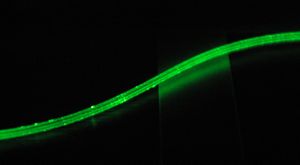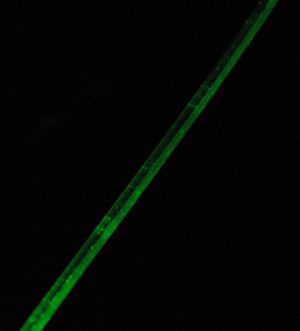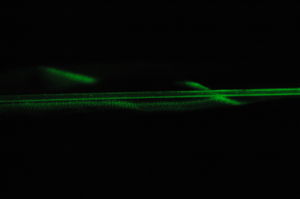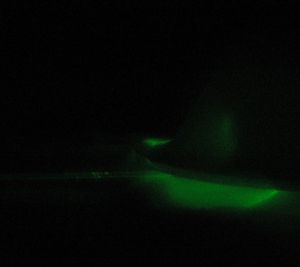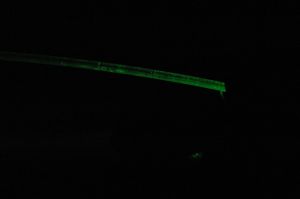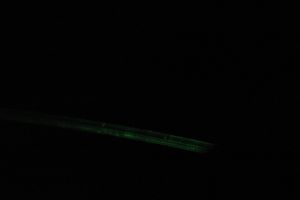Difference between revisions of "Laser Images"
| Line 4: | Line 4: | ||
I took the segments of wave guide that I had examined under microscope and exposed them to a green laser pointer with very little ambient light. The laser illuminated the wave guide and revealed the effects of surface damage. Areas with fissures, dust, or residue sparkled under the green light. This indicates significant light loss. Understanding light loss is key to the success of the tagger microscope. | I took the segments of wave guide that I had examined under microscope and exposed them to a green laser pointer with very little ambient light. The laser illuminated the wave guide and revealed the effects of surface damage. Areas with fissures, dust, or residue sparkled under the green light. This indicates significant light loss. Understanding light loss is key to the success of the tagger microscope. | ||
| − | [[ File:Cropped Used WG Loss LengthwiseDSC 0169.JPG |thumb|center|The effect of many surface imperfections becomes obvious when looking at a length of illuminated light guide. (Previously processed light guide. MFR: Saint Gobain BCF-98)]] | + | [[ File:Cropped Used WG Loss LengthwiseDSC 0169.JPG |thumb|center|Figure 1: The effect of many surface imperfections becomes obvious when looking at a length of illuminated light guide. (Previously processed light guide. MFR: Saint Gobain BCF-98)]] |
==Surface Imperfections== | ==Surface Imperfections== | ||
| Line 10: | Line 10: | ||
Details of the damage are visible in these pictures. | Details of the damage are visible in these pictures. | ||
| − | Figure : In the upper right-hand third of the image are two parallel bands outlining a section of wave guide that seems brighter. This corresponds to the glue residue from the sticky labeling system. Other damage can also be seen. | + | Figure 2: In the upper right-hand third of the image are two parallel bands outlining a section of wave guide that seems brighter. This corresponds to the glue residue from the sticky labeling system. Other damage can also be seen. |
| − | [[File:Cropped Used Surface imperfections 1 DSC 0200 (2).JPG |thumb|left| Detailed surface imperfections in previously processed light guide. (MFR: Saint Gobain BCF-98)]] | + | [[File:Cropped Used Surface imperfections 1 DSC 0200 (2).JPG |thumb|left| Figure 2: Detailed surface imperfections in previously processed light guide. (MFR: Saint Gobain BCF-98)]] |
| − | Figure : Nicks, gouges, and residues coat the length of the fiber, causing light loss everywhere. | + | Figure 3: Nicks, gouges, and residues coat the length of the fiber, causing light loss everywhere. |
| − | [[File:Cropped Used surface imperfect 2 DSC 0201.JPG |thumb| Surface imperfections in previously processed light guide. (MFR Saint Gobain; BCF-98)]] | + | [[File:Cropped Used surface imperfect 2 DSC 0201.JPG |thumb| Figure 3: Surface imperfections in previously processed light guide. (MFR Saint Gobain; BCF-98)]] |
=New Fibers= | =New Fibers= | ||
Revision as of 06:25, 28 December 2015
Used Fibers
Light Loss Along Length
I took the segments of wave guide that I had examined under microscope and exposed them to a green laser pointer with very little ambient light. The laser illuminated the wave guide and revealed the effects of surface damage. Areas with fissures, dust, or residue sparkled under the green light. This indicates significant light loss. Understanding light loss is key to the success of the tagger microscope.
Surface Imperfections
Details of the damage are visible in these pictures.
Figure 2: In the upper right-hand third of the image are two parallel bands outlining a section of wave guide that seems brighter. This corresponds to the glue residue from the sticky labeling system. Other damage can also be seen.
Figure 3: Nicks, gouges, and residues coat the length of the fiber, causing light loss everywhere.
New Fibers
Clarity
Freshly cut light guide demonstrates remarkable clarity and minimal light loss. These images illustrate the smoothness of an undamaged surface.
